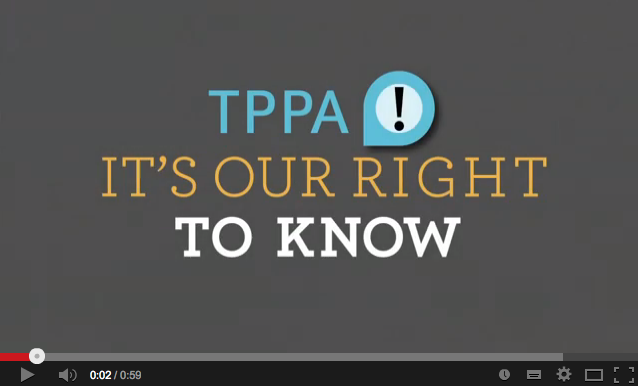The Government claims the trade benefits from the Trans Pacific Partnership may reach $5b. But as manufacturing goes offshore, resulting in increasing joblessness and a hollowing out of the domestic economy, many of us are concerned about the costs.
Existing free trade deals like the ‘celebrated’ agreement with China provide some evidence of the impacts. China now takes the place previously held by Third World countries who were import substitution manufacturing bases for consumer economies. Jobs are lost in developed countries, as low labour and environmental standards in the developing world provide competitive advantage. Off-shore production avoids domestic requirements for quality control, safety, environmental standards and durability and we’re flooded with cheaper, but nastier goods, ultimately destined for the landfill.
Demand generation through planned and technical obsolescence encourages a jobless, debt ridden domestic economy. In a sad way that’s good for consumers, because despite the loss of local manufacturing and jobs, and less real money in circulation, even poor families, with the help of easy credit, can buy the latest plastic toys, clothes, toaster, washing machine or flat screen TV. Free trade is convenient for the consumer because things have never been relatively cheaper, but they’re wicked for the planet.
We can’t guarantee it’s all good for the areas where New Zealand has a current competitive advantage either. With the advent of the China Free Trade deal, we’ve seen insertion of Chinese interests in the complete dairy supply chain for instance. Never mind Chinese consumers buying Fonterra milk, soon they will be able to buy Chinese milk, made in New Zealand. In this case, our lax environmental and labour laws encourage investment in New Zealand farms.
But we also worry about our intellectual and cultural property rights, our Treaty rights, the national interest in Pharmac, in regulating against harmful products, and non-tariff barriers to free trade like labour and environmental protections – inadequate as they already are. Just how much is the Government prepared to trade away, in the interests of trade?
Trade is most free when partners have matching, minimal, domestic laws. So in the interests of free and easy capitalism, agreements legally empower corporations and give them the right to apply pressure to remove trade barriers across member states. Ultimately future laws in member countries face deregulation pressure, otherwise, least regulated economies have competitive advantage. Under the Investor State Disputes process, foreign investors can also sue our Governments if they think lawmakers diminish the investor’s future profits. The tobacco lobby’s legal challenges against plain packaging in Australia, and John Key’s reluctance to further legislation here in advance of the outcome of that case, show that free trade is already affecting the national interest and the exercise of sovereign powers. Given the existing corporate power in setting domestic policy agendas, worse may be yet to come. Limited sovereignty, environmental, social and economic costs – free trade is not really free.






All these Free Trade Agreements are a alot of BS with strings attached, the USA Dairy Lobby Group will never allow access of NZ Dairy Products into the USA exclusive of tarriffs or quotas so it is not a Free Trade Agreement. Just like Australia have banned NZ Apples for over 100 years on ficticous phytosanitary grounds.
Key and his cronies are babes in the woods when it comes to International Trading green as grass would best describe them or lambs to the slaughter.
Key and his cronies will always kowtow to the more powerful no matter how much damage that will do to NZ. Unfortunately, there’s a large number of Labour candidates that will do exactly the same.
Excellent article, Christine. Further on the TPPA issue is this piece by Mark Harris;
http://publicaddress.net/speaker/tpp-error-correction/
It is well worth a look.
The TPPA is essentially a Corporate power and profit assurance tool dressed up and disguised as a “Free trade” Agreement. There is nothing for Free in the TPP document.
The only people that would consider Free trade, Free markets, and Free collective agreements-“FREE” are libertarians.
Nice article Christine
It’s ironic that we may well be saved from the corporate TPPA through the US Congress deciding to “pick apart” any final agreement. In that case, it’s Game Over for this nasty piece of work.
The TPPA will be an utter disaster for New Zealand economically over the long-term, as most free trade-agreements the world over have shown. Everyone with at least half a brain knows this, which is why I find it so confounding that our Government utterly fails to represent the interests of its actual voters. Last time I checked businesses and corporations couldn’t vote, so why does any government align themselves with these entities? Why do voters put up with it? Are voters really this naïve?
The government doesn’t even consider the interests of the voters as they only consider what’s good for business.
Businesses exist to serve the people, not the other way around. There wouldn’t even be businesses if it weren’t for people, though people can survive without businesses (albeit in a very different form of society).
As a person who applied for over 40 jobs in our small town, and now work on a minimum wage which gets me no where, this agreement will certainly do more harm than good. As it is now, you cannot find NZ made stuff alot. Our foodstuffs are getting more and more foreign too. Sad, when we are meant to be green and pure…
Voters do not count in NZ, John Key is the Managing Director and major shareholder in NZ Inc.
Key has no interest in what is best for New Zealanders he is acting in the best interests of the groups he represents the BRT and his relatives in Wall St.
One day New Zealanders will wake up.
Comments are closed.